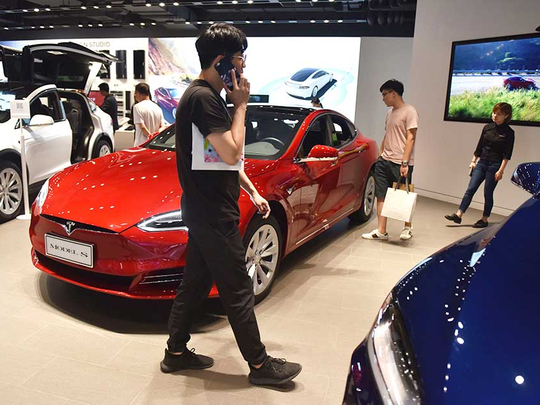
SYDNEY/HONG KONG: Less than a week into President Donald Trump’s trade war with China, global automakers have shown there are ways to bypass the battle — and scoring a win for Beijing in the process.
Tesla Inc. and BMW AG are among the biggest potential losers from Beijing’s retaliatory tariffs on car imports from the US because much of their production is centred in America. They’re now doubling down in China: this week, Tesla announced its first factory outside the US while BMW is poised to become the first foreign manufacturer to own majority control of a Chinese automobile venture. Cars made locally by foreign brands will dodge import levies.
While those deals have taken months — if not longer — to come together, the investments by Munich-based BMW and Palo Alto, California-based Tesla back up Beijing’s claim to be continually opening up its economy and help rebut allegations of protectionism by the Trump administration.
“China is not backtracking, which is China’s most clever response to the trade war,” said Alicia Garcia Herrero, chief Asia-Pacific economist at Natixis SA in Hong Kong.
China and the US imposed 25 per cent tariffs on $34 billion (Dh124.8 billion) of the others’ imports on July 6, and Beijing has vowed to fight back against proposed tariffs on an additional $200 billion in Chinese goods in the tit-for-tat proposals between the world’s two largest economies.
It’s against that background that Tesla announced its China plant.
“This is not only an achievement of China’s self-initiated opening up, it is also an embodiment of win-win economic cooperation between China and the US,” Gao Feng, a spokesman for the Ministry of Commerce in Beijing said this week.
Trump has criticised Harley-Davidson Inc. since the motorcycle maker said it would move some production overseas as a result of retaliatory levies by the European Union. Encouraging US producers like Tesla and BMW to increase domestic investment can be seen as a notch in China’s favour in the trade war.
BMW is set to be the first foreign car company to take control of its Chinese enterprise under an agreement between China and Germany, China’s Foreign Ministry said. The luxury automaker will soon reveal a new ownership structure of its joint venture with Brilliance China Automotive Holdings Ltd., according to a person familiar with the plan.
No such deal with the US has been announced, although China plans to eventually scrap the joint venture rule in the automotive industry by 2022.
Tesla, the biggest name in electric cars, sealed a crucial agreement to build a fully owned plant in China, only the company’s second assembly line anywhere in the world. The first car will be locally produced in about two years, and the factory will eventually have an annual capacity of 500,000 cars.
“Going forward, I expect China to open more selectively to EU companies than to US ones,” said Natixis’s Herrero.












